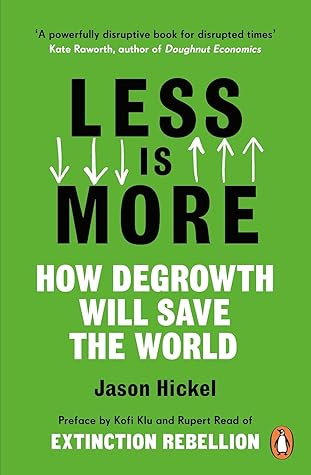More on this book
Community
Kindle Notes & Highlights
by
Jason Hickel
Read between
August 7 - August 8, 2025
It can be difficult to grasp the implications of this. We tend to take the idea of growth for granted because it sounds so natural. And it is. All living organisms grow. But in nature there is a self-limiting logic to growth: organisms grow to a point of maturity, and then maintain a state of healthy equilibrium. When growth fails to stop – when cells keep replicating just for the sake of it – it’s because of a coding error, like what happens with cancer. This kind of growth quickly becomes deadly.
This is odd, because Nicoya is one of the poorest parts of Costa Rica, in monetary terms. It is a subsistence economy where people live traditional, agricultural lifestyles. So what explains these results? Costa Rica has an excellent public healthcare system, so that’s a big part of it. But the researchers found that Nicoyans’ extra longevity is due to something more. Not diet, not genes, but something completely unexpected: community. The longest-living Nicoyans all have strong relationships with their families, friends and neighbours. Even in old age, they feel connected. They feel valued.
...more
In other words, the global climate crisis is being driven largely by the global rich. And things become even more lopsided as we climb the income ladder. Individuals in the richest 1% emit one hundred times more than individuals in the poorest half of the human population.28 Why? It’s not only because they consume more stuff than everybody else, but also because the stuff they consume is more energy-intensive: huge houses, big cars, private jets, frequent flights, long-distance holidays, luxury imports, and so on.29 And if the rich have more money than they can spend, which is virtually always
...more
Public services are almost always less intensive than their private equivalents. Britain’s National Health Service, for instance, emits only one-third as much CO2 as the American health system, and delivers better health outcomes in the process.
Some critics worry that if you give people more time off they’ll spend it on energy-intensive leisure activities, like taking long-haul flights for holidays. But the evidence shows exactly the opposite. It is those with less leisure time who tend to consume more intensively: they rely on high-speed travel, meal deliveries, impulsive purchases, retail therapy, and so on. A study of French households found that longer working hours are directly associated with higher consumption of environmentally intensive goods, even when correcting for income.31 By contrast, when people are given time off
...more
This may sound radical, but there’s plenty of precedent for it. Ancient Near-Eastern societies regularly declared non-commercial debts void, clearing the books and liberating people from bondage to creditors. This principle was institutionalised in the Hebrew Law of Jubilee, which decreed that debts should be automatically cancelled every seventh year.48 Indeed, debt cancellation became core to the Hebrew concept of redemption itself.
More than 90% of the money that’s presently circulating in our economy is created in this manner. In other words, almost every single dollar that passes through our hands represents somebody’s debt. And this debt has to be paid back with interest – with more work, more extraction and more production. This is extraordinary, when you think about it. It means that banks effectively sell a product (money) that they produce out of nothing, for free, and then require people to go out into the real world and extract and produce real value to pay for it. It is so outlandish as to offend common sense.
...more
How much richer would our experience of the living world be if we regarded it as pulsing with intention and sociality? Who lives there? What are they like? What is their experience? What will we say to one another? Even just to imagine living this way seems like a portal to an enchanted world – one that’s hidden somehow right in plain view. Anthropologists refer to this way of being as animism. The religious studies scholar Graham Harvey defines animism quite simply as the claim ‘that the world is full of persons, only some of whom are human, and that life is always lived in relationship with
...more
All of this runs exactly against the logic of capitalism. Capitalism ultimately relies on a single, overarching principle: take more than you give back. We’ve seen this logic in action for 500 years, beginning with enclosure and colonisation. In order to accumulate surplus, you have to extract uncompensated value from nature and bodies, which must be objectified and rendered as ‘external’.


